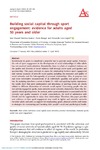Building Social Capital Through Sport Engagement: Evidence for Adults Aged 50 Years and Older

Use este enlace para citar
http://hdl.handle.net/2183/37230
Excepto si se señala otra cosa, la licencia del ítem se describe como Atribución 4.0 Internacional (CC BY 4.0)
Colecciones
- Investigación (FEE) [923]
Metadatos
Mostrar el registro completo del ítemTítulo
Building Social Capital Through Sport Engagement: Evidence for Adults Aged 50 Years and OlderFecha
2024Cita bibliográfica
Sánchez-Santos JM, Rungo P, Lera-López F (2024). Building social capital through sport engagement: evidence for adults aged 50 years and older. Ageing & Society 44, 403–428. https://doi.org/ 10.1017/S0144686X22000046
Resumen
[Abstract] Involvement in sports is considered a powerful way to generate social capital. However, the role of sport engagement in the development of social relationships of older adults has not received much attention. Remarkably, there is a lack of empirical evidence on the quality and diversity of social relations built through active sport participation and spectatorship. This paper attempts to assess the relationship between sport engagement and various measures of network social capital, including the extension and quality of social networks and the heterogeneity of personal relationships. Also, it proposes new and more informative measurements of an individual's quantity and quality of social ties. By analysing data from a survey in Spain (N = 600) and applying logistic regressions, the results show that sport participation and attendance at sporting events are closely related to different dimensions of network social capital. Concerning people who are not actively engaged in sports, more extensive social networks characterise those who frequently attend sporting events. In contrast, active sport participation is associated with the extensity and quality measures of social connectedness, the level of satisfaction with friends and the opportunity to enjoy close relationships. Therefore, this paper provides new evidence on how sport engagement may result in tighter and extensive networks for older adults and serve as support for emphasising sports, physical activity and leisure as strategies for maintaining and boosting older people's social and psychological health.
Palabras clave
Older adults
Individual social capital
Social networks
Personal relationships
Relational goods
Social trust
Sport engagement
Individual social capital
Social networks
Personal relationships
Relational goods
Social trust
Sport engagement
Versión del editor
Derechos
Atribución 4.0 Internacional (CC BY 4.0)
ISSN
0144-686X
1469-1779
1469-1779






